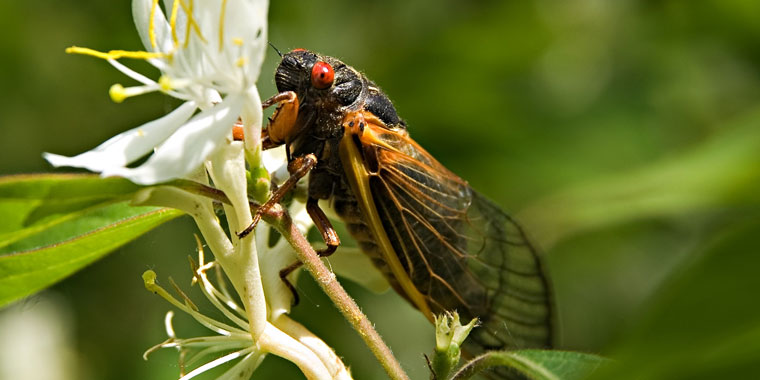Wake Me When It’s Over: Coping With 17-Year Cicadas

Answer a few questions and we'll provide you with a list of primary care providers that best fit your needs.
The fear we harbor in our imagination is often more terrifying than the reality that hides behind it. Anticipating what lurks around the next corner, creeps under the bed, or sleeps just beneath the surface is an essential element for suspense writers and horror filmmakers alike. However, occasionally life — or sometimes nature — imitates art.
This spring, Southwest Ohioans will both hear and witness the emergence of billions of cicadas as they climb out from their underground burrows to mate after lying dormant for 17 years. Though harmless, their deafening drone, bright red eyes, and bulky exoskeletons are seemingly straight out of a science fiction movie. For many, the cicadas are a familiar nuisance, but for others, they are simply more fodder for their nightmares.
Premier Health Now spoke with psychiatrist Christina Waite, MD, medical director for psychiatry at Miami Valley Hospital, to learn more about the possible sources of cicada-driven fear and anxiety, and to better understand how you can overcome it.
This Too Shall Pass
The social and economic disruption brought on by the COVID-19 pandemic may have caused other residual effects that a vaccine simply could not prevent.
“The pandemic has left many of us feeling a totally out of control,” says Dr. Waite. “In a sense, the cicadas represent yet one more element we can’t stop or avoid. On top of that, social media has added a concentrated focus on this event in a way that was simply non-existent when this last happened 17 years ago. It’s kind of a perfect storm for anxiety.”
Dr. Waite offers the encouragement that the cicada brood’s lifecycle is a short one that only lasts for four to six weeks. In the meantime, she offers some helpful advice to those who may be struggling to cope with these unwelcome visitors.
“One of the first things I would suggest is to find someone you can talk to about your fear,” says Dr. Waite. “These are noisy creatures that none of us is really prepared for, even if we’ve lived through it before. Isolation only adds to our anxiety, so confiding in a friend, family member, or medical professional can be very helpful.”
In addition, Dr. Waite suggests that it can be extremely helpful to take the time to learn the details about the 17-year cicadas and their place in the earth’s ecosystem. Read about them and view photos and videos. The more you know about these extraordinary creatures, the more it desensitizes fear and gives you the ability to think rationally in a way that may even give way to a sense of appreciation.
She recommends additional ways to desensitize your fear:
- Talk about cicadas in positive ways by avoiding conversations with emotionally charged words.
- Go see a live cicada from a distance with someone you trust and stay for a set period of time (for example, five minutes).
- Consider viewing them up close with someone you trust once you're comfortable with seeing them from a distance.
- Remember this season will only last for about six weeks and then you can say goodbye to them for another 17 years.
“If we can take the time to learn about cicadas and even talk about our anxieties with others, we’ll begin to understand just how fascinating and brief their lifecycle actually is —even if we are glad to see them go,” says Dr. Waite.
Answer a few questions and we'll provide you with a list of primary care providers that best fit your needs.
Sources: Christina Waite, MD, Medical Director for Psychiatry, Miami Valley Hospital; Scientific American





